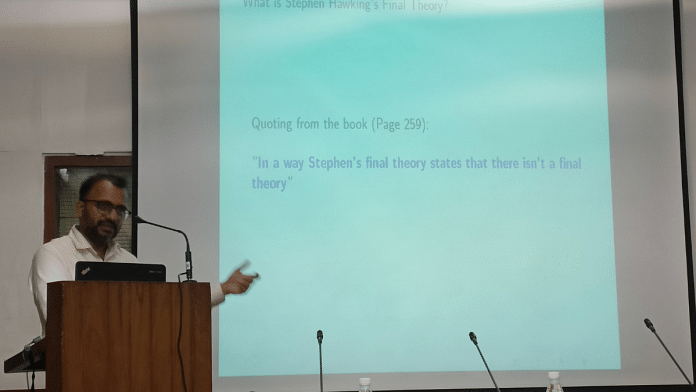New Delhi: Nearly a decade ago, Stephen Hawking said, “Philosophy is dead”. In an earlier book titled The Grand Design, the world-renowned physicist had even argued that questions usually dealt with by philosophers were now in the realm of science.
Despite such strong convictions, Hawking could not resist philosophical inquiry in his final years, and his last theory unwittingly pays homage to the field he believed was dead. In his new book called On the Origin of Time, Belgian cosmologist and Hawking’s key collaborator Thomas Hertog tackles the centuries-old question: What is the origin of the universe? The book, which Hertog wrote on Hawking’s insistence before he died, shows that the answer lay somewhere between quantum physics and a branch of Indian philosophy.
The discussion about the book at Delhi’s India International Centre (IIC) last week witnessed the who’s who of academia and philosophy enthusiasts in attendance. The panel featured Sanil Unnikrishnan, an assistant professor of physics, and Alphy Geever, a professor of philosophy, at St. Stephens’ College. The discussion was moderated by KP Fabian, a former Indian Foreign Service (IFS) officer who now teaches at the Indian Society of International Law, New Delhi.
“Physics is actually just philosophy but written in the language of mathematics,” Unnikrishnan said, kickstarting the discussion before an audience of about 20 members.
Also read: Question on everybody’s mind at Delhi book launch – Is the Arab-Israeli conflict still on?
Hawking’s last theories
Hertog, who was a PhD student under Hawking, worked with the scientist for more than two decades. In On the Origin of Time, he delves into ‘uncomfortable’ questions that modern physicists are still grappling with. While quantum physics has come up with innumerable theories about the origin of the universe and black holes, few have answered why the universe is the way it is. These inquiries, Hertog writes, are beyond “the comfort zone of physics”.
And this is exactly where philosophy creeps into Hawking’s theory, said Geever.
She said the fundamental question that the book addresses is actually a philosophical one. “From ancient Greek philosophy to Vedanta philosophy to Stephen Hawking, I realised that it is human nature to wonder about creation and even the creator,” she added.
Was it all just an accident? Hawking and Hertog studied whether the laws of physics were ‘bio-friendly’ or capable of supporting life. They wanted to go beyond the multiverse theory, which states that the universe is one among many parallel worlds, with life being a result of pure chance. “Hawking wasn’t satisfied with this answer,” said an amused Unnikrishnan.
Whereas most origin theories assume an observer’s standpoint, which Hertog calls the ‘God’s eye’ perspective, On the Origins of Time proposes a new way of looking at cosmology. Hertog and Hawking claim that any theory about the universe’s origins must also take into account humans as part of the process.
“The observer is a part of what is being observed and must be treated as such,” said Unnikirshnan.
Also read: 12,000 yrs, 101 chapters and one question—How many pasts does India have?
A Darwinian side to physics
In the book, Hawking and Hertog put forward the idea that the physical laws of our universe have evolved gradually since the Big Bang — the laws of space, time, and gravity that govern us today were not always in their current form.
“The way Darwin proposed evolution to understand the current biological world, Hawking proposes evolution to understand the cosmological world. No theory or law of physics is constant — it all evolved alongside the Big Bang and might continue to evolve hereon,” Unnikrishan explained to a curious audience.
This is where Hindu philosophy came in. Geever pointed out how an evolutionary perspective on the universe coincided with the Hindu philosophical concepts of srishti (nature) and pralaya (catastrophe) that are mentioned in the Upanishads. This strand of philosophy talks about an eternal universe in which creation and destruction occur constantly. This philosophy does not talk of an ultimate beginning or “ex-nihilo creation” where matter comes out of nothing. “Hindu philosophy acknowledges the changing nature of the universe, [and] so does Hawking [in the book],” Geever said with an almost triumphant note.
The audience erupted in heated dialogues when the panellists finished discussing their ideas. “Can there be a design to the universe without a designer? Does philosophy acknowledge a creator?” asked Fabian, echoing the questions of many audience members.
For Geever, this answer, too, lay in ancient Indian philosophy. “While philosophies about the creation do sometimes rely on a ‘creator’, there are non-agential explanations too. Srishti and pralaya do not propose a creator. The universe itself undergoes its creation and its destruction,” she explained.
Unnikrishnan, though, was the modern science counterpart to Geever’s traditionalist theories. “Time evolved with the Big Bang, as did every other law we observe in the universe today. Hertog said that, in a way, Hawking’s final theory is that there may be no final theory,” he said.
(Edited by Humra Laeeq)



